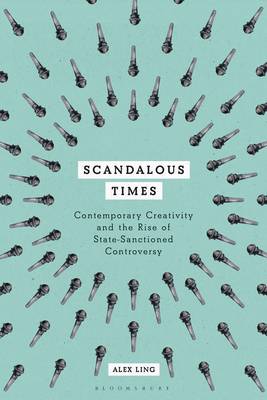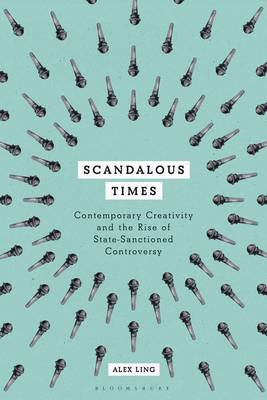
Bedankt voor het vertrouwen het afgelopen jaar! Om jou te bedanken bieden we GRATIS verzending (in België) aan op alles gedurende de hele maand januari.
- Afhalen na 1 uur in een winkel met voorraad
- In januari gratis thuislevering in België
- Ruim aanbod met 7 miljoen producten
Bedankt voor het vertrouwen het afgelopen jaar! Om jou te bedanken bieden we GRATIS verzending (in België) aan op alles gedurende de hele maand januari.
- Afhalen na 1 uur in een winkel met voorraad
- In januari gratis thuislevering in België
- Ruim aanbod met 7 miljoen producten
Zoeken
Scandalous Times
Contemporary Creativity and the Rise of State-Sanctioned Controversy
Alex Ling
Hardcover | Engels
€ 228,95
+ 457 punten
Omschrijving
We live in scandalous times. Every day some new controversy demands our attention, our emotional investment, and, ultimately, our judgment. Many of these routine transgressions will be understood in 'revelatory' terms, as peeling back the multiple layers of artifice and spin to reveal an underlying, and oftentimes disturbing, 'truth'. Otherswill be recognized as calculated marketing exercises that simply present the strategic face of contemporary capitalism.
Yet these 'ordinary' scandals can themselves be seen to be largely derivative of another, altogether more fundamental-and fundamentally rare-form of disruption. Such is the real scandal that accompanies instances of authentic creation. Building on the philosophy of Alain Badiou, Scandalous Timesnot only argues the case for such 'real scandal', but also shows how it is today being abrogated and substituted through the increasing production of novel forms of state-sanctioned controversy.
From Duchamp to Donald Trump, Scandalous Times explores the ways in which areas from art and advertising to politics and social media have come to actively contribute to this 'static' fabrication of controversy, all the while arguing for the need to rethink creativity as a radical exception to the state, and not its proxy.
Yet these 'ordinary' scandals can themselves be seen to be largely derivative of another, altogether more fundamental-and fundamentally rare-form of disruption. Such is the real scandal that accompanies instances of authentic creation. Building on the philosophy of Alain Badiou, Scandalous Timesnot only argues the case for such 'real scandal', but also shows how it is today being abrogated and substituted through the increasing production of novel forms of state-sanctioned controversy.
From Duchamp to Donald Trump, Scandalous Times explores the ways in which areas from art and advertising to politics and social media have come to actively contribute to this 'static' fabrication of controversy, all the while arguing for the need to rethink creativity as a radical exception to the state, and not its proxy.
Specificaties
Betrokkenen
- Auteur(s):
- Uitgeverij:
Inhoud
- Aantal bladzijden:
- 208
- Taal:
- Engels
Eigenschappen
- Productcode (EAN):
- 9781350068551
- Verschijningsdatum:
- 15/10/2020
- Uitvoering:
- Hardcover
- Formaat:
- Genaaid
- Afmetingen:
- 156 mm x 234 mm
- Gewicht:
- 467 g

Alleen bij Standaard Boekhandel
+ 457 punten op je klantenkaart van Standaard Boekhandel
Beoordelingen
We publiceren alleen reviews die voldoen aan de voorwaarden voor reviews. Bekijk onze voorwaarden voor reviews.









